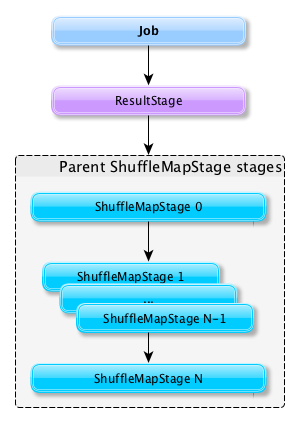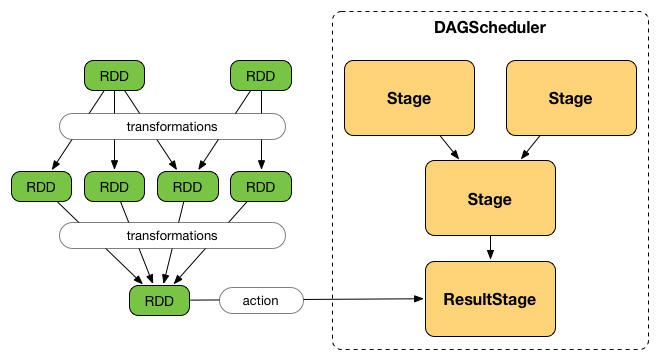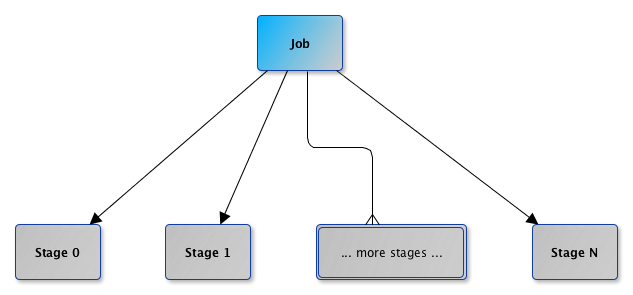Stage¶
Stage is a unit of execution (step) in a physical execution plan.
A stage is a set of parallel tasks -- one task per partition (of an RDD that computes partial results of a function executed as part of a Spark job).

In other words, a Spark job is a computation with that computation sliced into stages.
A stage is uniquely identified by id. When a stage is created, DAGScheduler.md[DAGScheduler] increments internal counter nextStageId to track the number of DAGScheduler.md#submitStage[stage submissions].
[[rdd]] A stage can only work on the partitions of a single RDD (identified by rdd), but can be associated with many other dependent parent stages (via internal field parents), with the boundary of a stage marked by shuffle dependencies.
Submitting a stage can therefore trigger execution of a series of dependent parent stages (refer to DAGScheduler.md#runJob[RDDs, Job Execution, Stages, and Partitions]).

Finally, every stage has a firstJobId that is the id of the job that submitted the stage.
There are two types of stages:
- ShuffleMapStage.md[ShuffleMapStage] is an intermediate stage (in the execution DAG) that produces data for other stage(s). It writes map output files for a shuffle. It can also be the final stage in a job in DAGScheduler.md#adaptive-query-planning[Adaptive Query Planning / Adaptive Scheduling].
- ResultStage.md[ResultStage] is the final stage that executes rdd:index.md#actions[a Spark action] in a user program by running a function on an RDD.
When a job is submitted, a new stage is created with the parent ShuffleMapStage.md[ShuffleMapStage] linked -- they can be created from scratch or linked to, i.e. shared, if other jobs use them already.

A stage tracks the jobs (their ids) it belongs to (using the internal jobIds registry).
DAGScheduler splits up a job into a collection of stages. Each stage contains a sequence of rdd:index.md[narrow transformations] that can be completed without rdd:spark-rdd-shuffle.md[shuffling] the entire data set, separated at shuffle boundaries, i.e. where shuffle occurs. Stages are thus a result of breaking the RDD graph at shuffle boundaries.

Shuffle boundaries introduce a barrier where stages/tasks must wait for the previous stage to finish before they fetch map outputs.

RDD operations with rdd:index.md[narrow dependencies], like map() and filter(), are pipelined together into one set of tasks in each stage, but operations with shuffle dependencies require multiple stages, i.e. one to write a set of map output files, and another to read those files after a barrier.
In the end, every stage will have only shuffle dependencies on other stages, and may compute multiple operations inside it. The actual pipelining of these operations happens in the RDD.compute() functions of various RDDs, e.g. MappedRDD, FilteredRDD, etc.
At some point of time in a stage's life, every partition of the stage gets transformed into a task - ShuffleMapTask.md[ShuffleMapTask] or ResultTask.md[ResultTask] for ShuffleMapStage.md[ShuffleMapStage] and ResultStage.md[ResultStage], respectively.
Partitions are computed in jobs, and result stages may not always need to compute all partitions in their target RDD, e.g. for actions like first() and lookup().
DAGScheduler prints the following INFO message when there are tasks to submit:
Submitting 1 missing tasks from ResultStage 36 (ShuffledRDD[86] at reduceByKey at <console>:24)
There is also the following DEBUG message with pending partitions:
New pending partitions: Set(0)
Tasks are later submitted to TaskScheduler.md[Task Scheduler] (via taskScheduler.submitTasks).
When no tasks in a stage can be submitted, the following DEBUG message shows in the logs:
FIXME
Latest StageInfo Registry¶
_latestInfo: StageInfo
Stage uses _latestInfo internal registry for...FIXME
Making New Stage Attempt¶
makeNewStageAttempt(
numPartitionsToCompute: Int,
taskLocalityPreferences: Seq[Seq[TaskLocation]] = Seq.empty): Unit
makeNewStageAttempt creates a new TaskMetrics and requests it to register itself with the SparkContext of the RDD.
makeNewStageAttempt creates a StageInfo from this Stage (and the nextAttemptId). This StageInfo is saved in the _latestInfo internal registry.
In the end, makeNewStageAttempt increments the nextAttemptId internal counter.
Note
makeNewStageAttempt returns Unit (nothing) and its purpose is to update the latest StageInfo internal registry.
makeNewStageAttempt is used when:
DAGScheduleris requested to submit the missing tasks of a stage
Others to be Reviewed¶
== [[findMissingPartitions]] Finding Missing Partitions
[source, scala]¶
findMissingPartitions(): Seq[Int]¶
findMissingPartitions gives the partition ids that are missing and need to be computed.
findMissingPartitions is used when DAGScheduler is requested to DAGScheduler.md#submitMissingTasks[submitMissingTasks] and DAGScheduler.md#handleTaskCompletion[handleTaskCompletion].
== [[failedOnFetchAndShouldAbort]] failedOnFetchAndShouldAbort Method
Stage.failedOnFetchAndShouldAbort(stageAttemptId: Int): Boolean checks whether the number of fetch failed attempts (using fetchFailedAttemptIds) exceeds the number of consecutive failures allowed for a given stage (that should then be aborted)
NOTE: The number of consecutive failures for a stage is not configurable.
== [[latestInfo]] Getting StageInfo For Most Recent Attempt
[source, scala]¶
latestInfo: StageInfo¶
latestInfo simply returns the <<_latestInfo, most recent StageInfo>> (i.e. makes it accessible).
== [[internal-properties]] Internal Properties
[cols="30m,70",options="header",width="100%"] |=== | Name | Description
| [[details]] details | Long description of the stage
Used when...FIXME
| [[fetchFailedAttemptIds]] fetchFailedAttemptIds | FIXME
Used when...FIXME
| [[jobIds]] jobIds | Set of spark-scheduler-ActiveJob.md[jobs] the stage belongs to.
Used when...FIXME
| [[name]] name | Name of the stage
Used when...FIXME
| [[nextAttemptId]] nextAttemptId | The ID for the next attempt of the stage.
Used when...FIXME
| [[numPartitions]] numPartitions | Number of partitions
Used when...FIXME
| [[pendingPartitions]] pendingPartitions | Set of pending spark-rdd-partitions.md[partitions]
Used when...FIXME |===